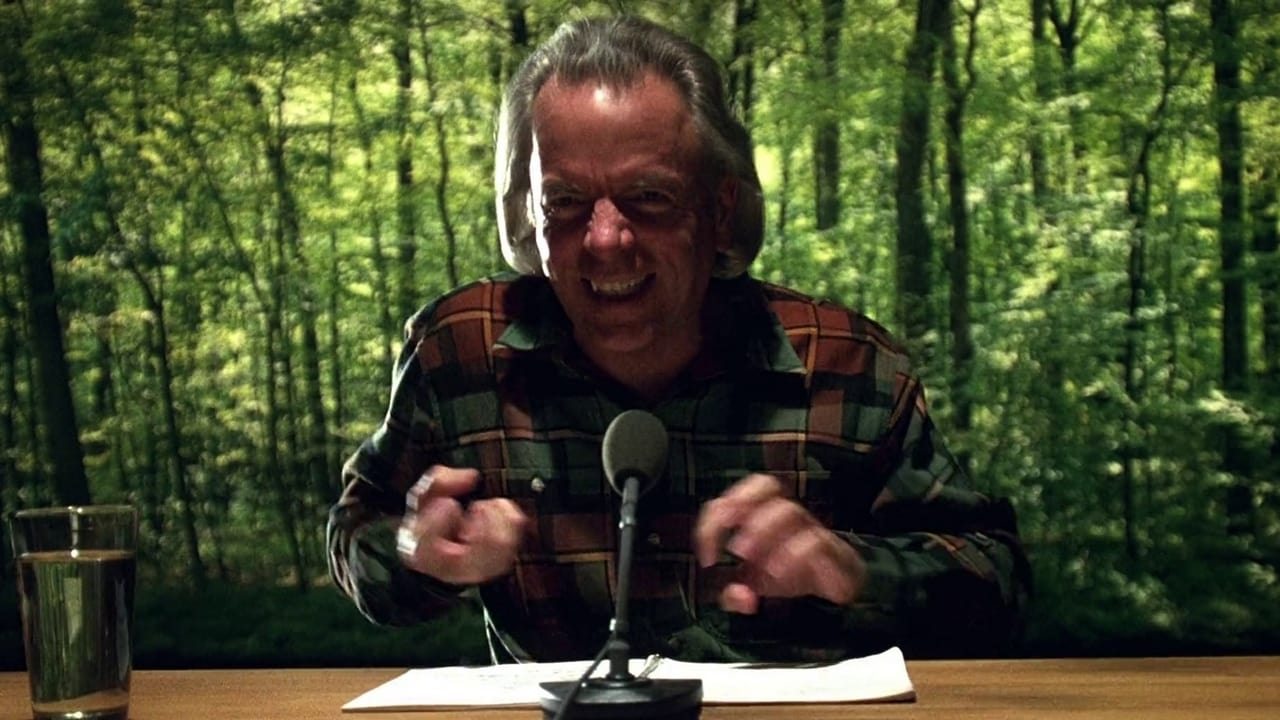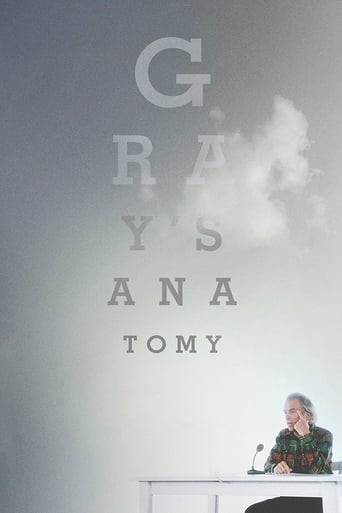



Good story, Not enough for a whole film
A Masterpiece!
I wanted to like it more than I actually did... But much of the humor totally escaped me and I walked out only mildly impressed.
View MoreThere are moments that feel comical, some horrific, and some downright inspiring but the tonal shifts hardly matter as the end results come to a film that's perfect for this time.
View MoreLike the greatest, most professional poet, Spalding Gray tells him stories at a swift, rhythmic pace that is exciting and brilliant all at once. With his pitch perfect timing and comedic wit, he weaves together here a masterpiece of the monologue as he recounts his bizarre, eye opening (yes, pun intended) adventure after he discovered he had an eye problem. Rather than simply accepting a surgery (he really doesn't like it when the doctors refer to their work as "scraping"), he attempts to work out alternative methods, which range from an all raw vegetable diet to traveling to the Philippians to visit a so called "psychic surgeon". As a master of the monologue, Gray tells this story miraculously well. He writes with a beautiful and distinct quality. Through his storytelling, he expresses himself in a truly unique and entertaining way, packing this one man show with laughs and personality.I must also praise the director, the famous Steven Soderbergh, who morphs this monologue into a visually stunning art film. Using music, sound, sets, props, camera movement, shadows, and plenty of other fascinating, experimental techniques, he turns Gray's witty writings into a much more cinematic and epic adventure that truly captures Gray's quirky and strange view of life.
View MoreWow, a great film. It is one of a kind, so I can't compare it to anything else. Those of us from the 60s who knew the weirdos Spaulding consulted, especially enjoyed the film. His ability to enter the skin of so many characters instantly, while still looking at them from the outside, is a real gift. He is not sarcastic. He "likes to learn things" and hence in this film we find him raking leaves in a Hassidic synagogue, "eye"ing Japanese psychic surgery patients whisking around an operating table; gasping for air, his mouth pressed to the bottom of a sweat lodge tent; and in one particularly hilarious segment, submitting to treatment by a seriously nearsighted "nutritional optometrist." I loved this movie. It is a riveting example of storytelling, of the power of one human voice to mesmerize the rest of us.
View MoreI saw this film a couple of times when it aired on cable, and didn't really know who the director was at the time. I recognized Spalding Gray, as I had seen at least one other of his one-man monologue movie/shows that pop up every now and again on TV. His style of telling stories is sardonic, sad, a tinge in the cynical, always pointing out idiosyncrasies when he can, and always with a sense of the truth. When I found out that this particular one, Gray's Anatomy, was directed by Steven Soderbergh, it finally made sense. Because the style of the project fits the rest of the director's oeuvre without a misstep. It might not be one his great films, but he makes material that should, in what would really be the right reason, be on a stage somewhere off-Broadway (not off-off but not on it either) into something much more compelling for the screen. He uses a combination of varied angles, experimental lighting with colored filters, lenses, the lengths messed up, and messes with light and dark. His DP, Elliot Davis, also a very good asset on Out of Sight, makes this a key part of the engrossment (or what might be for others a distance) in the material. And of course the editing makes one pay attention to bits more closely than others, or accentuates some of the points that Gray makes. The music chimes in unconventionally as well. In this particular case, Gray is talking about health, but more than anything his own as he goes through the process of going to doctors, finding out his illness, getting it cured, et all. But it's not really all that simple, due to some of Gray's own neuroses and other bits of problems that come up, one or two his though mostly on the end of the eccentric doctors and others along his trip. This is not all, however, because through this story of fixing a real medical problem, it off-shoots into bits of topics about New York, Judaism, and his family. Soderbergh understands more than anything the mind-set of a guy like Gray, what he might have had, and the best a director like he can do is keep up with the sparks in the material. It's a good one man-show given better directorial treatment. It flirts with overkill in the style (only so much one man can take even in 80 minutes), but in the end after seeing it more than once I felt comfortable not just with the style but, more importantly, Gray himself. It's like style in a three-legged race to the finish with the substance, as the quirks in each threaten to tumble on another over. And, to be sure, it's under the radar enough in the indie-world to keep its ambitions only so reaching. B+
View MoreWhen Spalding Gray is diagnosed as having an eye condition, he goes to a doctor to discuss a course of action. When the issue of surgery comes up it launches Gray on a journey to get a cure that sees him reconnecting with his Christian Scientology roots before other treatments including a physic surgeon, cutting out some foods and a Native American sweat lodge.Spalding Gray's monologues are very much a matter of taste -many audiences do not like spoken word shows or films and even those that do may not like Gray. I am of the mind that any story teller than can hold my interest for 80 minutes is worth listening to. As an ex-cleaner I have listened to many of my older colleagues talk ad infinitium about their medical problems but none did so with the wit and invention of Gray. He tells a simple story of alternative treatments and such but every little detail is painted with great words. He also manages to inject wit into it - the funniest moment being where he is told that he cannot eat fish (cause they eat certain sea cucumbers in the wild that have chemicals) and he cannot eat chicken because they feed fish to chicken; he finds a farmer's market selling fish bred in captivity (hence, he reckons, unlikely to have eat the sea cucumbers), buys it but then is told that they feed the fish ground up chicken!.Gray is captivating. At times he is a bit too hyper and his mannerisms are a little irritating in a spoilt Western-hypochondriac type of way, but this is just my prejudice getting in the way. He is a very good story teller and he makes for a good focus. The talking heads add value but really were unnecessary to carry the film. As director, Soderbergh finds himself with a difficult task: does he just point the camera and let the words do the work or does he try to mix it up? He goes for adding to the words and, in some cases he does (The Elvis of surgeons for example) but too often he just blurs the camera behind colours and rippled images. It still works but the words don't need help and often Soderbergh's influence is unnecessary even if it isn't unwelcome.Overall this is an enjoyable story that is very well told with words that do not only inform but paint and expand on the basic tales. Soderbergh feels that he must do something to justify the difference between film and stage and some of his influence works - but happily even when it doesn't it can be ignored. One of the more accessible and enjoyable of Gray's monologues, this film is a perfect way to reflect upon the man in the shadow of his untimely death.
View More